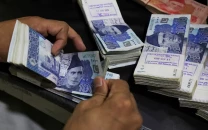US tariffs threaten exports, give India an edge
Higher duties on Pakistani goods risk $6b in exports, could pressure forex reserves, trigger unemployment; govt under

Pakistan, caught off guard by the US's new reciprocal tariffs, may face devastating effects, including losing its export edge to peer countries, particularly India. This situation could lead to pressure on foreign exchange reserves and increased unemployment in export-led industries. It could also intensify pressure on Pakistan's already stagnant exports, as its largest market is the United States.
"Pakistan was not expecting any tariffs to be imposed by the US," said Karachi Chamber of Commerce and Industry (KCCI) President Jawed Bilwani while speaking to The Express Tribune. Buyers have agreed to bear half of the tariff impact, but Pakistani exporters remain deeply concerned as profit margins are already low.
"We had a meeting with the prime minister, and he assured us that efforts are underway. The PM said they are working on it, and something will be done within the next three days. If nothing happens, the situation will become very difficult," Bilwani stated.
He further suggested that since Israel has secured duty exemptions on its exports to the US by eliminating duties on US exports, Pakistan should also negotiate for a similar arrangement. "We should assess the potential losses and evaluate the impact of removing duties on American products imported into Pakistan before making any decisions," he added. Pakistan is facing higher tariffs than India, further threatening its competitiveness, he said. Europe and the US are Pakistan's largest markets, and if factories shut down due to loss of orders, it will lead to widespread unemployment, he warned.
Out of Pakistan's total $29 billion in exports, $6 billion is destined for the US. Meanwhile, US imports in 2024 stood at $3.36 trillion, marking a 6% year-on-year increase. Pakistan's share in US imports was only 0.16% in 2024, whereas Vietnam, Bangladesh, Sri Lanka, and India had shares of 4.2%, 0.26%, 0.09%, and 2.7%, respectively.
Bilwani suggested that there might be underlying strategic objectives behind the US tariffs, as Pakistan's share in US imports is relatively small.
Pakistan's economy is heavily reliant on textiles, apparel, surgical instruments, and salt, a significant portion of which go to the US, said Lasbela Chamber of Commerce and Industry President Ismail Suttar.
"This is a fall that we cannot take considering our ongoing economic crises," said Suttar. "The Government of Pakistan should adopt a multi-pronged strategy to mitigate the economic and diplomatic impact. Otherwise, we are more exposed to the threat that the EU might also reassess its trade policies toward Pakistan based on US actions."
Executive Director of the Centre for Peace and Development Initiatives (CPDI) Mukhtar Ahmad Ali stated that higher tariffs could impact Pakistan's textile, leather, and rice exports to the US. However, since competitors are also facing tariffs, the overall impact may not be significant. He stressed the need for a detailed item-by-item analysis to assess the impact and identify opportunities, particularly where Pakistan's competitors are subject to higher tariffs. Additionally, reducing the cost of doing business is crucial to mitigating the impact.
"Pakistan will lose its cost advantage over India and Turkey, with textile exports to the US expected to drop by up to $1 billion out of the $5 billion total," said Ahsan Mehanti Arif, Managing Director of Habib Commodities. However, he pointed out that negotiations could be possible, as Pakistan imports $8 billion worth of US raw cotton duty-free.
Muzzammil Aslam, Advisor to the KP CM on Finance, noted that while Pakistan's Most Favored Nation (MFN) tariff is 11% compared to the US's 5%, its trade-weighted average tariff is lower due to zero-tariff imports of raw materials and machinery from the US. Despite the negative impact of the 29% tariff, Aslam suggested that Vietnam, Bangladesh, and Sri Lanka might benefit, while Turkey and Far Eastern countries could gain an advantage.





















COMMENTS
Comments are moderated and generally will be posted if they are on-topic and not abusive.
For more information, please see our Comments FAQ